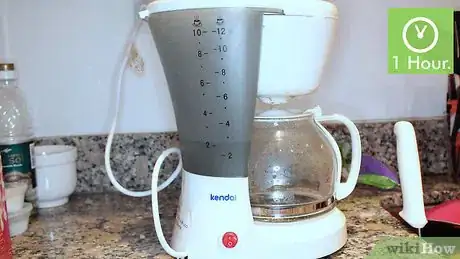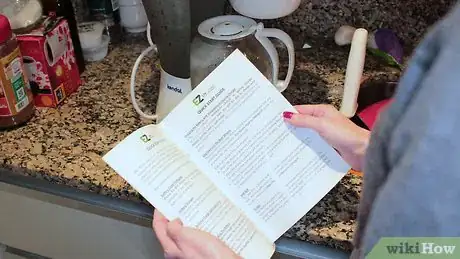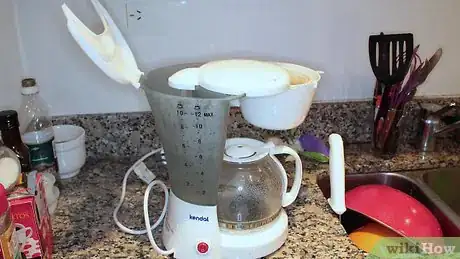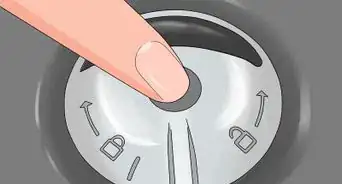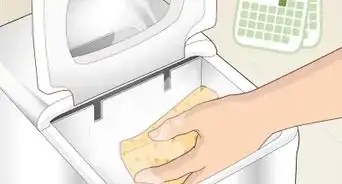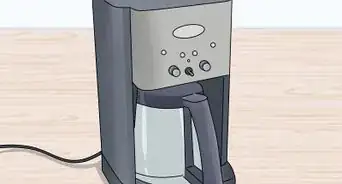This article was co-authored by Jonathan Tavarez. Jonathan Tavarez is the Founder of Pro Housekeepers, a premium cleaning service headquartered in Tampa, Florida catering to residential and commercial clients across the United States. Since 2015, Pro Housekeepers uses rigorous training methodologies to ensure high quality cleaning standards. Jonathan has over five years of professional cleaning experience and has over two years of experience as the Communications Director for the United Nations Association Tampa Bay. Jonathan earned a BS in Management and Marketing from the University of South Florida in 2012.
wikiHow marks an article as reader-approved once it receives enough positive feedback. This article has 19 testimonials from our readers, earning it our reader-approved status.
This article has been viewed 3,378,124 times.
Coffee makers are convenient household appliances that can provide you with a fresh cup of java first thing in the morning. However, due to the high levels of moisture, they can easily harbor mold and bacteria. Drip filter coffee makers require cleaning after each use. They also need to be deep cleaned monthly to remove hard water deposits, leftover coffee oils, and other impurities. With a little elbow grease, you can keep your coffee maker nice and clean.
Steps
Cleaning Your Coffee Maker After Each Use
-
1Disassemble the coffee maker. Remove any parts that come off, such as the pot, the brew basket, and any other removable parts. These part should be cleaned separately from the rest of the coffee maker.[1]
-
2Wash the removable parts. Submerge the removable parts in warm, soapy water, and wash them using a dish rag. You can wash removable parts of your coffee maker the same way you would wash dishes.[2]
- Glass pots can be very breakable. When washing your coffee maker's pot, treat the glass gingerly.
- Some coffee makers may have parts that can be washed in a dishwasher. Check the instructions manual, if you still have it. If you're unsure if your coffee maker can be washed in the dishwasher, err on the side of caution and hand wash it.
Advertisement -
3Wipe down the outside of the machine. Take a wet, soapy rag and give the outside of the machine a good wipe down. Wipe down the sides and remove any coffee grinds from the warming plate. When you're down, wipe off any soap suds with a clean, damp rag.[3]
-
4Reassemble your machine. After all the parts are dry, you can put your coffee machine back together. It is ready to use again. Make a habit of cleaning your coffee maker like this after each use.
Deep Cleaning Your Coffee Maker
-
1Add a vinegar and water solution to your coffee maker.[4] Make a mixture using 2 parts warm water and 1 part white vinegar.[5] The precise amounts will vary depending on the size of your coffee maker, but make roughly enough to fill the reservoir. Pour the mixture into the reservoir like you normally would with water when making coffee.[6]
-
2
-
3Let the coffee maker sit for an hour. Set a timer for an hour. Let the coffee pot sit for this time frame.[9] This will give the vinegar time to sit in the machine and clean out any mold.
-
4
-
5
-
6Wipe down the coffee maker. After disinfecting the coffee maker, take a clean, damp rag. Wipe down the exterior of the machine to remove any dirt and debris. You should also make sure to remove coffee grinds from the warming plate.[14]
Avoiding Common Mistakes
-
1Read your instruction's manual. If you still have the instructions manual, read it before cleaning your coffee maker. Most coffee makers can safely be cleaned with a vinegar/water mixture, but it's always a good idea to check first.[15]
- If you don't have the instructions manual, try looking up your model online. You may be able to find an instructions manual on the Internet.
-
2Leave the reservoir lid open. Many people keep the reservoir lid closed. However, it's a good idea to leave it open when not in use. This will help dry out the machine, preventing mold and bacteria from growing in a moist environment.
-
3Rinse the brew basket in the sink regularly. The brew basket is very susceptible to mold as it gets wet during the brewing process. Make sure you rinse out the brew basket after each use and make a habit of cleaning it each time you do dishes. This will keep your coffee maker mold and germ free.[16]
Expert Q&A
-
QuestionHow often should you clean a coffee maker?
 Marcus ShieldsMarcus is the owner of Maid Easy, a local residential cleaning company in Phoenix, Arizona. His cleaning roots date back to his grandmother who cleaned homes for valley residents in the 60’s through the 70’s. After working in tech for over a decade, he came back to the cleaning industry and opened Maid Easy to pass his family’s tried and true methods to home dwellers across the Phoenix Metro Area.
Marcus ShieldsMarcus is the owner of Maid Easy, a local residential cleaning company in Phoenix, Arizona. His cleaning roots date back to his grandmother who cleaned homes for valley residents in the 60’s through the 70’s. After working in tech for over a decade, he came back to the cleaning industry and opened Maid Easy to pass his family’s tried and true methods to home dwellers across the Phoenix Metro Area.
House Cleaning Professional Try to deep clean your coffee maker once a month so mold doesn't grow inside of it, especially if you use it every day.
Try to deep clean your coffee maker once a month so mold doesn't grow inside of it, especially if you use it every day. -
QuestionHow do I clean my coffee maker without vinegar?
 Jonathan TavarezJonathan Tavarez is the Founder of Pro Housekeepers, a premium cleaning service headquartered in Tampa, Florida catering to residential and commercial clients across the United States. Since 2015, Pro Housekeepers uses rigorous training methodologies to ensure high quality cleaning standards. Jonathan has over five years of professional cleaning experience and has over two years of experience as the Communications Director for the United Nations Association Tampa Bay. Jonathan earned a BS in Management and Marketing from the University of South Florida in 2012.
Jonathan TavarezJonathan Tavarez is the Founder of Pro Housekeepers, a premium cleaning service headquartered in Tampa, Florida catering to residential and commercial clients across the United States. Since 2015, Pro Housekeepers uses rigorous training methodologies to ensure high quality cleaning standards. Jonathan has over five years of professional cleaning experience and has over two years of experience as the Communications Director for the United Nations Association Tampa Bay. Jonathan earned a BS in Management and Marketing from the University of South Florida in 2012.
Property Hygiene Enabler Denture cleaning tabs tend to work well when left in a carafe full of water for about 30 minutes!
Denture cleaning tabs tend to work well when left in a carafe full of water for about 30 minutes! -
QuestionHow can I get rid of the vinegar taste after cleaning with vinegar?
 Community AnswerDo a full cup of water. Let it run through.
Community AnswerDo a full cup of water. Let it run through.
References
- ↑ http://www.goodhousekeeping.com/home/cleaning/tips/a26565/cleaning-coffee-maker/
- ↑ http://www.goodhousekeeping.com/home/cleaning/tips/a26565/cleaning-coffee-maker/
- ↑ http://www.goodhousekeeping.com/home/cleaning/tips/a26565/cleaning-coffee-maker/
- ↑ Jonathan Tavarez. Property Hygiene Enabler. Expert Interview. 13 September 2019.
- ↑ Marcus Shields. House Cleaning Professional. Expert Interview. 22 September 2019.
- ↑ http://www.thekitchn.com/how-to-clean-a-coffee-maker-cleaning-lessons-from-the-kitchn-200908
- ↑ Jonathan Tavarez. Property Hygiene Enabler. Expert Interview. 13 September 2019.
- ↑ http://www.thekitchn.com/how-to-clean-a-coffee-maker-cleaning-lessons-from-the-kitchn-200908
- ↑ http://www.southernliving.com/how-to/how-to-clean-a-coffee-pot
- ↑ Jonathan Tavarez. Property Hygiene Enabler. Expert Interview. 13 September 2019.
- ↑ http://www.thekitchn.com/how-to-clean-a-coffee-maker-cleaning-lessons-from-the-kitchn-200908
- ↑ Jonathan Tavarez. Property Hygiene Enabler. Expert Interview. 13 September 2019.
- ↑ http://www.thekitchn.com/how-to-clean-a-coffee-maker-cleaning-lessons-from-the-kitchn-200908
- ↑ http://www.thekitchn.com/how-to-clean-a-coffee-maker-cleaning-lessons-from-the-kitchn-200908
- ↑ http://www.consumerreports.org/coffee-makers/how-to-clean-your-coffee-maker/
- ↑ http://www.consumerreports.org/coffee-makers/how-to-clean-your-coffee-maker/
About This Article
To clean your coffee maker, disassemble the moving parts and wash them in warm, soapy water. Wipe down the outside of the machine. Then, reassemble it once the parts are dry. If you need a deeper cleaning, mix equal parts of water and vinegar. Pour the solution into the machine's reservoir. Brew half a cycle, then pause the machine for an hour so the pot and reservoir can soak in the solution. Then, resume the brew cycle. Dump the cleaning solution and brew 2 cycles of plain water to rinse out the coffee maker thoroughly. If you want to learn how to avoid growing mold and bacteria in the coffee maker, keep reading!


